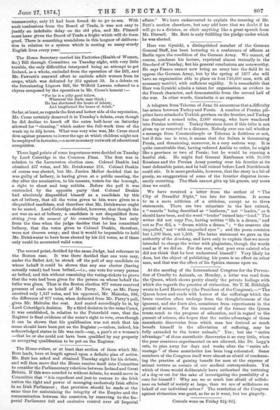Three legal points of some importance were decided on Tuesday
by Lord Coleridge in the Common Pleas. The first was in relation to the Launceston election case. Colonel Deakin had -obtained 457 votes, and Mr. Drinkwater 216. Colonel Deakin -of course was elected, but Mr- Justice Dielloe decided that he was guilty of bribery, in having given at a public meeting, the day after the nomination, to his tenants, voters for the borough, -a right to shoot and trap rabbits. Before the poll it was contended by the opposite party that Colonel Deakin had absolutely disqualified himself as a candidate by this act of bribery, that all the votes given to him were given to a disqualified candidate, and therefore that Mr. Drinkwater ought to be seated. Lord Coleridge decided, however, that though the -act was an act of bribery, a candidate is not disqualified from sitting from the moment of his committing bribery, but only from the time when the judge decides that he has committed bribery, that the votes given to Colonel Deakin, therefore, -were not thrown away; and that it would be impossible to hold Mr. Drinkwater to have been elected by his 216 votes, as if these only could be accounted valid votes.


































 Previous page
Previous page